Wendell Selectboard awaits legal review of battery storage bylaw
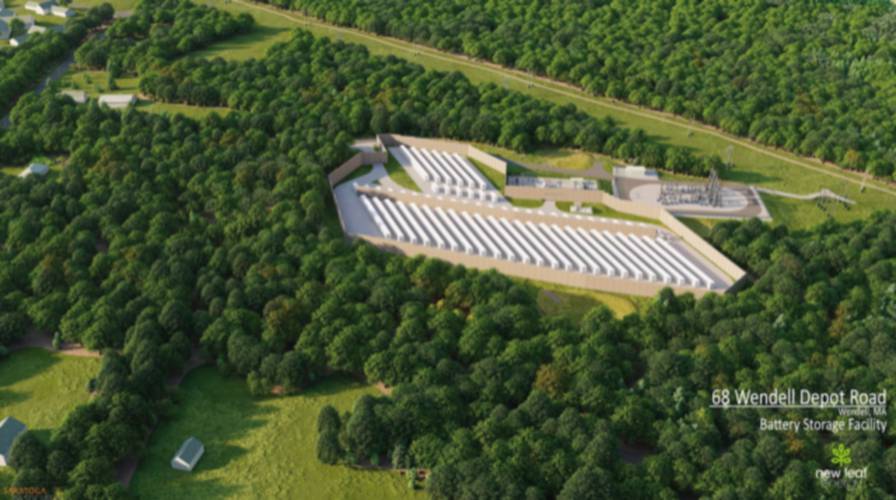
Lowell-based New Leaf Energy has proposed constructing a 105-megawatt battery storage facility off Wendell Depot Road in Wendell. CONTRIBUTED IMAGE
|
Published: 03-22-2024 3:51 PM
Modified: 03-25-2024 10:48 AM |
WENDELL — The Selectboard is waiting to hear from town counsel before taking a stance on a potential bylaw submitted by a citizens group opposing a 105-megawatt battery storage facility proposed for the center of town.
Selectboard members say they have not received input from Kopelman & Paige regarding the bylaw that No Assault & Batteries (NAB) wants adopted to define various terms and designate the Selectboard as voting members of a Licensing Board, which would convene to review applications submitted for a battery energy storage system license. Selectboard Chair Laurie DiDonato said at a meeting Wednesday that she would reach out to town counsel again.
A bylaw must be approved by voters at a Town Meeting. NAB member Nina Keller, who attended Wednesday’s meeting virtually, mentioned that hearing from a lawyer “sometimes takes longer than anticipated.” She also said NAB members are strongly considering proposing two bylaws — one endorsed by town counsel and one that has not been filtered by a lawyer — on a Town Meeting warrant, as the town of Carver is doing.
Under the proposed bylaw, the Licensing Board’s voting members would act as the granting authority for licenses. This board would also have one member each appointed from the Conservation Commission, Board of Health, Planning Board, Zoning Board of Appeals, Energy Committee, Municipal Light Board and Finance Committee. The Selectboard would designate one person to oversee and coordinate the Licensing Board’s application review process.
The proposed bylaw also lists various definitions, licensing requirements and safety regulations. A battery energy storage system, or BESS, would be defined as “an energy storage system that uses rechargeable batteries, which harness reversible electrochemical processes to store electrical energy using any battery chemistry, including lithium ion, lithium iron phosphate and many others.” A BESS is a stationary installation that may receive electrical energy to be stored directly from a generating facility, or from the electrical grid, or both. It must include rechargeable batteries and any related equipment or structures.
The bylaw also would require any applicant to have proof of $100 million in liability insurance to cover loss or damage to people and structures caused by the use or failure of any BESS facility. This would include coverage for fires, explosions and flooding events.
New Leaf Energy’s intent is to construct an industrial-size, lithium-ion battery storage site at 68 Wendell Depot Road.
“This project is just so inappropriate, even if it worked and wasn’t incredibly dangerous,” NAB member Anna Gyorgy said at a previous meeting.
Article continues after...
Yesterday's Most Read Articles
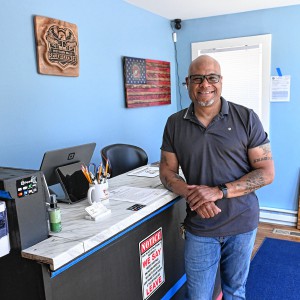 Retired police officer, veteran opens firearms training academy in Millers Falls
Retired police officer, veteran opens firearms training academy in Millers Falls
 Valley lawmakers seek shorter license for FirstLight hydropower projects
Valley lawmakers seek shorter license for FirstLight hydropower projects
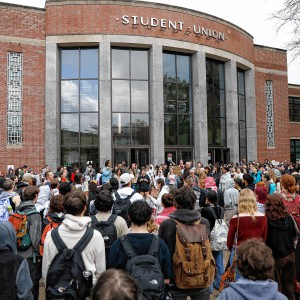 More than 130 arrested at pro-Palestinian protest at UMass
More than 130 arrested at pro-Palestinian protest at UMass
 Baseball: Caleb Thomas pitches Greenfield to first win over Frontier since 2019 (PHOTOS)
Baseball: Caleb Thomas pitches Greenfield to first win over Frontier since 2019 (PHOTOS)
 Real Estate Transactions: May 10, 2024
Real Estate Transactions: May 10, 2024
 As I See It: Between Israel and Palestine: Which side should we be on, and why?
As I See It: Between Israel and Palestine: Which side should we be on, and why?
In January 2023, New Leaf applied to the state Department of Public Utilities for a permit to proceed. According to New Leaf Energy’s project website, it is sited adjacent to existing electrical infrastructure and is an optimal location for new energy infrastructure.
In May 2023, the Energy Facilities Siting Board (EFSB) issued decisions in two previous battery storage proceedings that determined the EFSB does not have jurisdiction to site and approve battery energy storage systems under current statutes. The Wendell Energy Storage withdrew its petition to the EFSB because of this, and the EFSB stamp-granted the motion to withdraw on Aug. 17, 2023. The project is on hold with the state, pending further information from the proponent, as the Wendell Conservation Commission has denied an order of conditions for the project, which has been in development since 2020, due to the noise disruption to wildlife.
In response to this proposal, the Wendell Board of Health is working to draft regulations concerning utility-scale battery energy storage systems and wants the public’s input. Chair Barbara Craddock said it is important to hear what residents want, though any regulation must be within the health board’s authority.
According to a statement from the board, thermal runaway fires and the potential release of toxic chemicals from utility-scale BESS could harm the local drinking water supply, air quality and the physical safety of Wendell residents. The town has no municipal water system, relies entirely on local aquifers for drinking water, and has limited emergency response capacity to handle large-scale battery fires or the release of hazardous chemicals.
“The problem is, our town has had experience with contamination before,” Craddock said, referring to the issue of forever chemicals in Swift River School’s drinking water and a former landfill on Mormon Hollow Road. “Basically, we want to protect our air and water.”
According to the board’s statement, state law gives local boards of health the authority to enact reasonable regulations to protect public health, safety and welfare that expand upon existing state or local statutes. The Wendell board will consider requiring annual operating permits, periodic inspections, environmental monitoring and other conditions for utility-scale BESS.
“As a physician , I am p articularly concerned about the potential human health hazards posed by large-scale lithium battery storage facilities,” said Wendell Board of Health member James Frank. “While my family and I ar e committed to personal efforts to reduce our carbon footprint in addressing the threat s of climate change, we do not feel it should be done at the risk of compromising the well -being of residents of this small rural community.”
The public is invited to provide input by emailing boardofhealth@wendellmass.us.
A public input session is scheduled during the board’s March 25 meeting at 5:30 p.m. This will be a hybrid meeting, held in-person and via Zoom. Those wishing to speak during the public input session should email the board to register ahead of time. Information on how to join the meeting can be found on the board’s web page at tinyurl.com/yc33wvch and posted at the town office building at 9 Morse Village Road.
Reach Domenic Poli at: dpoli@recorder.com or 413-930-4120.

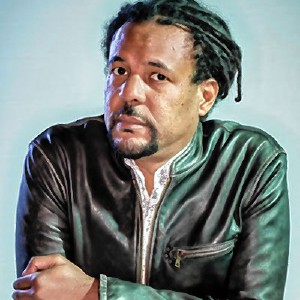 UMass graduation speaker Colson Whitehead pulls out over quashed campus protest
UMass graduation speaker Colson Whitehead pulls out over quashed campus protest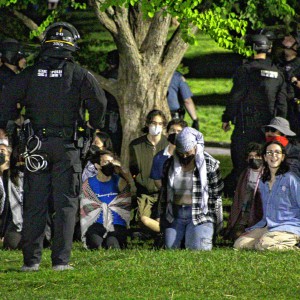 UMass student group declares no confidence in chancellor
UMass student group declares no confidence in chancellor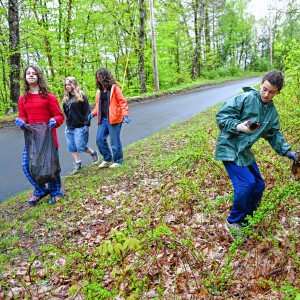 Four Rivers Climate Club organizes litter cleanup, panel on environmental activism
Four Rivers Climate Club organizes litter cleanup, panel on environmental activism
